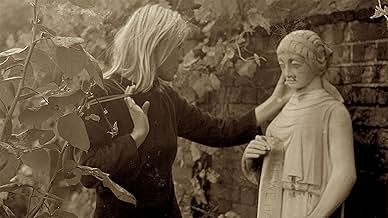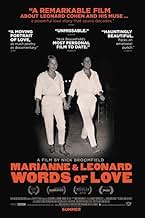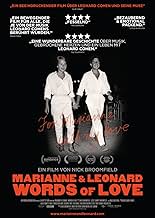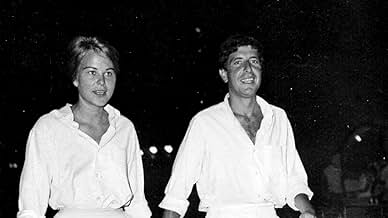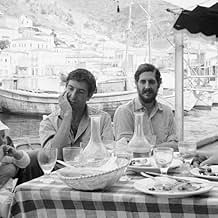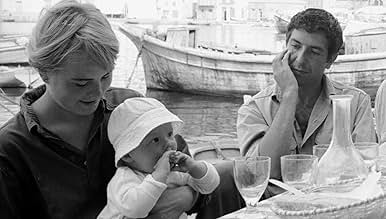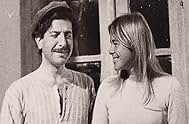Ajouter une intrigue dans votre langueAn in-depth look at the relationship between the late musician Leonard Cohen and his Norwegian muse Marianne Ihlen.An in-depth look at the relationship between the late musician Leonard Cohen and his Norwegian muse Marianne Ihlen.An in-depth look at the relationship between the late musician Leonard Cohen and his Norwegian muse Marianne Ihlen.
- Réalisation
- Scénario
- Casting principal
- Récompenses
- 2 victoires et 4 nominations au total
- Self
- (images d'archives)
- Self
- (images d'archives)
- Self
- (images d'archives)
- Self - Writer and Poet
- (as Richard Vick)
- Self
- (images d'archives)
- Self
- (images d'archives)
- Self
- (images d'archives)
Avis à la une
This film is rich in material and covers many fascinating topics including Cohen's career. It's fascinating to learn of his life and work before becoming a legendary singer/songwriter. And events surrounding his first stage appearance are very surprising considering the great career that followed. In addition, the film is often blunt about Cohen's struggles with depression.
"Marianne & Leonard" is beautifully expressed in the first half with a very poetic flow. It is blessed with amazing footage especially of Hydra in the early 60s. The film also joins many recent films in its depiction of the hedonism of the 60s and 70s ("Echo in the Canyon", "Gordon Lightfoot: If You Could Read My Mind", "Rocketman", "Bohemian Rhapsody"). At first, the drug scene and open marriage are exposed for their fun indulgence but the serious and devastating consequences are made very clear in the second half.
Some editing might have improved in the film's second half which occasionally meanders. Also, while it genuinely expresses the consequences of the earlier indulgences (especially for how children were affected), there are insertions of inappropriate drunkalogues ("Man, we were SO stoned that night, ya just wouldn't BELIEVE it").
While much of the second half negates the beauty of the earlier half, it is saved by an emotional conclusion that is so deeply moving, it could make a stone weep - a perfect conclusion for film that is sometimes mixed but overall quite good. - dbamateurcritic
It also leaves a great deal unsaid and hazy. The assumption is that the cultural moments of the day ( and the copious drugs) have blurred the stories in many many ways. Despite all of that it somehow brings the back story of Marianne and Leonard into focus in a very sweet way towards the end of the film.
A number of the interviewees are just plain great. Watch out forAviva Layton who seems to be uncredited but she deserves better.
In many ways this film could have been much better if we had got past the headlines. Archival footage is used but the viewpoint most of the time is very much the male point of view.
This much thoughtless behaviour seems highly paradoxical. The myth of the unreachable poet seems to have attracted considerable numbers of women to the Cohen fan club. They felt like they were being understood. But seems to me; if that were really true - the story would have turned out quite differently.
What lifts this film is the redemption towards the end when we see the famous letter from Leonard to Marianne. In his dying moments Leonard recognised the value of his connection with Marianne. Coverage of the 5 or 6 years in a Buddhist monastery definitely hints at a rebalancing of Cohens' personal life and perspectives.
All in all this is a rather gentle sideways look at a significant relationship but understandably it is overbalanced by the the celebrity aspects of the story.
Marianne herself is present in the story but mostly in a back handed compliment kind of way.
The titular Marianne was a complex personality in her own right, already married with a child when she met Cohen and lived with him on an off for several years in what was an open relationship on both sides.
Some complained about Marianne not having been fleshed out because Cohen was a famous poet and songwriter, hence more important. From my point of view, whatever artistic aspirations Marianne might have had, it never developed into any worthy works. Not because anybody prevented her from "creating", but because of her own free will she went back to Norway at the end of the story and worked in an office for the rest of her life.
It's certainly not up to the audience to judge what sort of relationship Marianne and Leonard should have had. For sure, it was something that lasted until the end of their lives (very moving message sent by Cohen to the dying Marianne) and who's to say that it wasn't perhaps the most perfect relationship ever?
Le saviez-vous
- AnecdotesA lot of the footage of the couple was shot by D.A. Pennebaker who had also stayed on the island of Hydra.
- Citations
Self, also narrator and interviewer: It was the 60s, in the time of free love and open marriage, including Leonard and Marianne's. I was a rather lost 20 year old visiting the island of Hydra when Marianne befriended me. For a short while, I became one of her lovers. She encouraged me to follow my dreams and she played me Leonard's songs under the Greek moon and stars. Her smile and enthusiasm were one of a kind and I fell completely intoxicated by the beauty of their relationship.
- ConnexionsEdited from Ladies and Gentlemen, Mr. Leonard Cohen (1965)
Meilleurs choix
- How long is Marianne & Leonard: Words of Love?Alimenté par Alexa
Détails
- Date de sortie
- Pays d’origine
- Site officiel
- Langues
- Aussi connu sous le nom de
- Marianne & Leonard: Aşk Sözleri
- Lieux de tournage
- Hydra, Grèce(island, main location)
- Sociétés de production
- Voir plus de crédits d'entreprise sur IMDbPro
Box-office
- Montant brut aux États-Unis et au Canada
- 1 012 034 $US
- Week-end de sortie aux États-Unis et au Canada
- 44 942 $US
- 7 juil. 2019
- Montant brut mondial
- 3 311 263 $US
- Durée1 heure 42 minutes
- Couleur
- Rapport de forme
- 1.78 : 1
Contribuer à cette page








